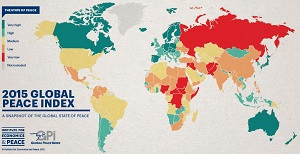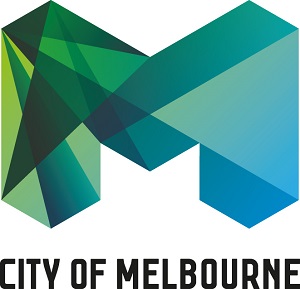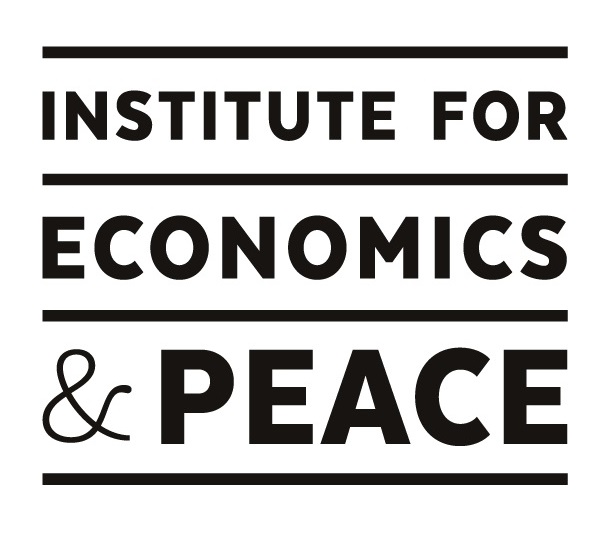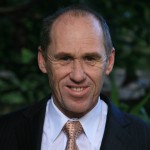VALA and the City of Melbourne are proud to host this important event, and to welcome Steve Killelea, AM, Founder and Executive Chairman of the Institute for Economics and Peace, to the Town Hall. Steve is in Melbourne for one night only to present the 2015 Global Peace Index (GPI) the world’s leading measure of global peacefulness.
Topic: “What can we learn from measuring peace?”
 VALA and the City of Melbourne invite you to a very special August Guest Speaker event. Join us at Swanston Hall, Melbourne Town Hall, on Wednesday 26 August from 5:30pm for the Melbourne launch of the 2015 Global Peace Index.
VALA and the City of Melbourne invite you to a very special August Guest Speaker event. Join us at Swanston Hall, Melbourne Town Hall, on Wednesday 26 August from 5:30pm for the Melbourne launch of the 2015 Global Peace Index.
- Listen to the event recording in Google Drive (36MB)
- Listen to the event recording in SoundCloud
- View the Powerpoint presentation slides
About the Institute for Economics and Peace (IEP)
The Institute for Economics and Peace (IEP) is an Australian-based and internationally respected independent think tank dedicated to shifting the world’s focus to peace as a positive, achievable and tangible measure of human well-being and progress.
About the Global Peace Index (GPI)
The GPI is the world’s leading measure of global peacefulness. Released annually since 2007, the Index gauges on-going domestic and international conflict, safety and security in society, and militarisation in 162 countries by taking into account 23 indicators. The 2015 edition of the GPI was released on 17 June at King’s College in London and at the UN Secretariat in New York City generating world-wide interest and media attention.
Steve Killelea is an accomplished entrepreneur in technology and international business development. He is also at the forefront of philanthropic activities focused on sustainable development and peace. Founder and Executive Chairman of the Sydney-based Institute for Economics and Peace, Steve was awarded an AM in 2010 for his service to the global peace movement and the provision of humanitarian aid to the developing world. CLICK HERE for more about Steve Killelea.
About the Event – What can we learn from measuring peace?
Peace is notoriously difficult to define and even more difficult to measure. IEP believes that in measuring peace we can identify the social, economic and political factors that help develop more peaceful societies. Through a statistical analysis of the relative peacefulness of different countries and regions, it is possible to assess whether our actions and polices are helping or hindering us in achieving our goals. Rigorous research and hard data allow the Institute to strip the word peace of its utopian connotations and to make it an achievable policy objective.
The Global Peace Index, produced annually by the IEP, ranks 162 countries according to their peacefulness. The latest edition of the Index shows that despite living in the most peaceful era in human history, the world has become less peaceful over the last seven years. The 2015 Index was released on the 17 June along with an analysis of trends in peace, security and violence over the last eight years and an economic calculation on the costs of violence to global GDP.
Peace is more than just the absence of war or conflict, peace is the presence of the many different elements that allow human wellbeing to flourish. The Pillars of Peace is a framework produced by IEP that identifies the attitudes, structures and institutions that underpin peaceful societies. There are eight Pillars that work together as a system to create and sustain peace; they are interdependent and mutually reinforcing.
In order to make this complex research relevant, IEP has created Vision of Humanity, a digital lab for curious minds to explore the complexity of peace and its causes. www.visionofhumanity.org contains interactive data visualisations, research reports, infographics and narratives that engage a diverse audience with the complex fabric of peace. The interactive Global Peace Index map allows you to explore peace around the world, discover country specific information and understand changes in peace over time.
Why is this important to libraries?
This presentation details both the work of the Institute for Economics and Peace, as well as providing insights into how the Institute measures peace and its economic impact. This is of interest to libraries as an important example of how one organisation works in partnership with other organisations (in this case OECD, United Nations, World Bank and so forth) to aggregate and analyse data, as well as develop engaging and informative infographics, to provide insight into the complex and multifaceted issues around peace and violence.
There are also many libraries, especially in the research, government, higher education and school sectors, which can use the research and resources of the IEP. IEP is already engaged with many of them, for example through its faculty network to examine links between economics and peace. For details see http://www.american.edu/kogod/news/020411_ksb_peace_economics_network.cfm.
FREE ENTRY
RSVP: limited numbers, so please register only if you will attend. No “no shows” please!
![]()
Not a VALA member?
Visitors are welcome at VALA meetings – but registration is essential!
VENUE
Swanston Hall
Melbourne Town Hall, 90 – 120 Swanston Street, Melbourne.
DATE & TIME
Wednesday 26 August 2015, 5:30 for 6:00 – 7:30pm
For any enquiries contact VALA Secretariat via vala@vala.org.au or (03) 9844 2933



